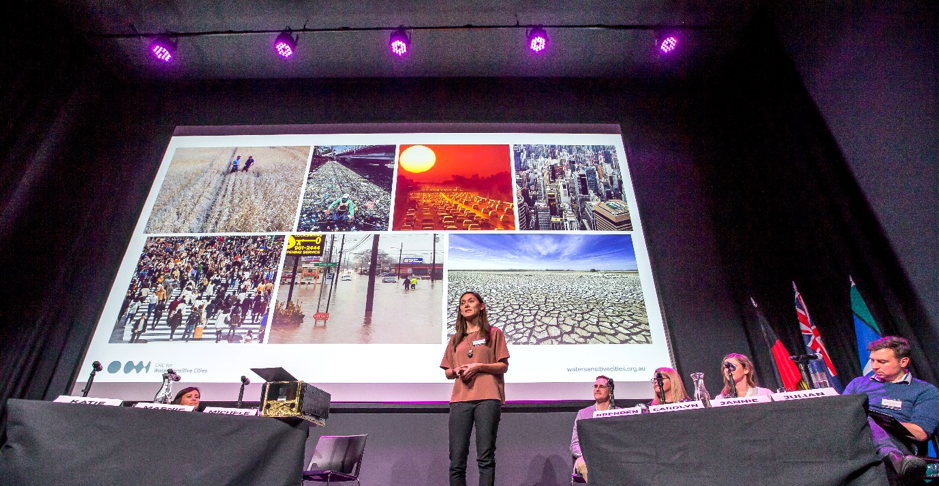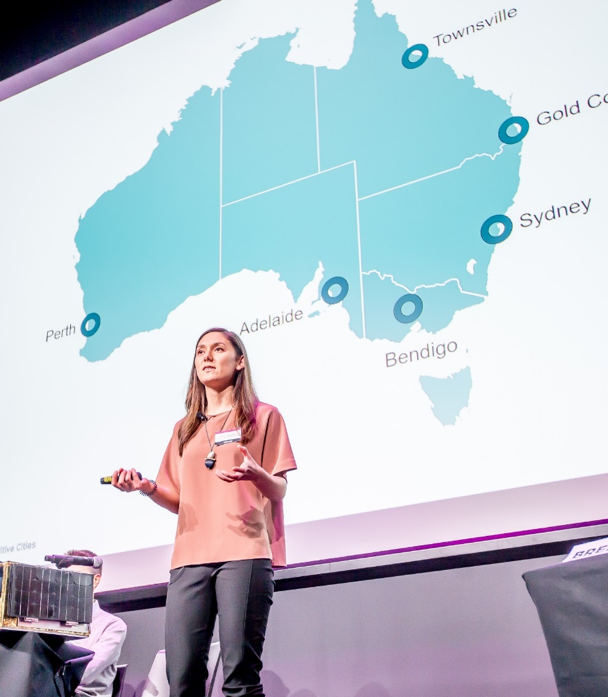CRCWSC researcher presents at national IMPACT7 science event

CRCWSC researcher, Katie Hammer, was one of 25 researchers from across Australia to present solutions to some of the globe’s most pressing challenges at the second annual IMPACT7 science event, held in partnership with CSIRO in Melbourne on 9 August 2018.
Katie used her three minute time allowance in the Future Cities section of the event to explain to the more than 300 attendees how the CRCWSC is supporting cities in delivering water sensitive solutions on the ground.
“With more and more people now living in cities, we need to ensure they are great places to live, and that they promote happy, healthy lifestyles”, Katie said. She explained that water plays an important role in creating these liveable cities, however traditional large-scale water infrastructure solutions may not be enough to deliver them. We are now seeing a need for more innovative solutions that integrate water, our urban and natural environments, and our communities.
Katie told the audience that the challenge now is not coming up with the technical solutions, but rather getting people to change the way they think and operate, and change the way they work together on the ground to deliver these solutions. She then went on to explain how the CRCWSC’s Integrated Research Project 1 has developed a transition planning process that enables collaboration and provides guidance for stakeholders wanting to embed water sensitive solutions in policy and practice.
“Undertaking this process has led to a better understanding of the range of actions needed to deliver these solutions on the ground, and how people’s individual actions can collectively create more liveable, water sensitive cities”, Katie said.
Anyone familiar with the TV show Shark Tank will have some idea of the high pressure format of the IMPACT7 event: Katie and her fellow researchers had to succinctly outline their case for a potential solution to a pressing global issue to a panel of experts and a large audience. The Future Cities panel comprised Brenden Carriker (CityLab Lead, City of Melbourne), Jannie McLeod (Business Development Manager, ARUP), Julian Waters-Lynch (Co-founder and Head of Strategy, TypeHuman) and Carolyn Curtis (CEO, The Australian Centre for Social Innovation).
We congratulate Katie on her outstanding contribution to this significant science conversation, and for representing the CRCWSC so well at the prestigious event.
You can find out more about IMPACT7 here. You can view Katie’s full presentation on YouTube.

@KatieMHammer one of our cohort of rising stars taking the work of @crcwsc into its next phase. https://t.co/QVlaejwCXx
— Tony Wong, CRCWSC (@tonywong_crc) August 9, 2018
#IMPACT7 @KatieMHammer of @crcwsc tells us: people are so used to thinking that there are too many barriers to change. Her team develops social and institutional solutions to facilitate cities' transition to a water sensitive future. pic.twitter.com/Y5QYlXpr6S
— IMPACT7 (@_IMPACT7_) August 9, 2018
Investigating what the future holds for cities according to @_IMPACT7_ presenters from @crcwsc @anucecs & @unimelb💧⚡️🛰 #IMPACT7
— IP Australia (@IPAustralia) August 9, 2018
Focus on informal networks and find organic opportunities for collaboration. Great takeaways from @KatieMHammer of @crcwsc . Thanks to all panelists and impact leaders for giving us a glimpse into the future of our cities. #IMPACT7
— IMPACT7 (@_IMPACT7_) August 9, 2018